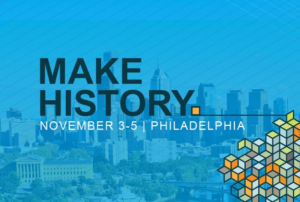 I’ve always had a deep-seated distrust of big business. Maybe it’s because I grew up with a social worker and teacher as parents, or because my first job out of school was with a nonprofit focused on fighting corporate abuses.
I’ve always had a deep-seated distrust of big business. Maybe it’s because I grew up with a social worker and teacher as parents, or because my first job out of school was with a nonprofit focused on fighting corporate abuses.
Whatever the reason, this wariness remained, even as my career pushed me toward social enterprise, entrepreneurship and business school. Coming to Ross and the Erb Institute, I knew I wanted to learn more about working in a large company. After all, huge company = potentially huge impact.
As part of this exploration, I attended the Net Impact conference in
Philadelphia. Net Impact is a membership organization for students and professionals who want to use business skills to solve social and environmental issues. They host an annual conference that highlights sustainable business projects and trends, and gives members the opportunity to network, recruit, and build skills.
This was one of the first times I had the chance to sit in a room and chat with folks who work for large corporations and, at the same time, care about sustainability. It reinforced some of the things I’ve been learning in the classroom, including:
1. Business is changing.
It is easy to continue to think of business as focused on shareholder value exclusively. And for some businesses, this remains true. But for many—especially those who chose to attend Net Impact—it is clear that business is changing. Companies are recognizing their role in sustainability by both treating the sustainability challenges they have created—ranging from environmental to community to labor and people challenges—as a cost of doing business and by taking responsibility to actively seek solutions to these challenges.
2. Collaborate, collaborate, collaborate.
I attended a session where sustainability professionals from Walmart, Kellogg and The Nature Conservancy discussed their ongoing collaboration to address environmental issues that are both critical to environmental stewardship and relevant to their business. They have been working together, as leaders in a larger coalition of businesses interested in sustainability, to identify and implement projects that are critical to the sustainability priorities of each company and also create significant, positive environmental change.
They gave us an opportunity to work through a process similar to the one they’ve gone through to identify an issue focus and build coalition consensus on objectives and paths forward. It was difficult. The path forward wasn’t clear or simple. It would have been easier to say: Let’s do this in a much smaller way ourselves, or let’s not do this at all. But these organizations were committed to the process. Why? Collaboration gave each of them a louder voice and enabled them to tackle more systemic, more daunting environmental sustainability challenges.
3. For me, sustainability humanizes business.
Small talk is hard for me. When I’m in front of a recruiter and I have two minutes to spew information, I sound ordinary at best. But when I can speak with a business representative on a topic about which I’m passionate—such as sustainable smallholder agriculture, food sourcing, inclusive hiring and scaling social business—I can be myself and see the business as part of the ecosystem involved in solving these challenges.
Sustainability humanizes me for these companies. It shows them my personal sense of purpose and interest in their work. And sustainability also humanizes businesses for me. It shows me that business can be more than just a machine designed to maximize profits. It shows me that businesses are made up of people who care about the same things I care about. And it shows me that some businesses are recognizing the incredible impact they have on our world and saying: We have long recognized our role as leaders in shaping the economic world. Now it is time to step up and lead in shaping the environmental and social world we live in together.